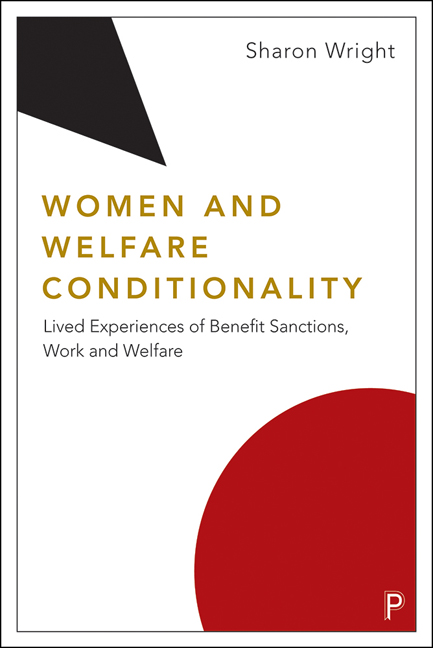Book contents
- Frontmatter
- Contents
- List of figure, tables and charts
- List of abbreviations
- Acknowledgements
- one What does work-based welfare reform mean for women?
- two Re-theorising conditional welfare as gendered lived experience and street-level practice
- three Policy context: the hidden gendered impacts of conditional welfare reforms
- four Rewriting retirement as ‘work experience’: older women’s gendered encounters with the work ethic
- five Crushing conditionality: women living through heavily enforced work-related conditionality
- six In the shadow of sanctions: disciplining women and children for violating male-defined work norms
- seven Conclusions
- Appendix 1 The Welfare Conditionality study
- Appendix 2 Sanctions overviews
- Notes
- References
- Index
five - Crushing conditionality: women living through heavily enforced work-related conditionality
Published online by Cambridge University Press: 27 March 2024
- Frontmatter
- Contents
- List of figure, tables and charts
- List of abbreviations
- Acknowledgements
- one What does work-based welfare reform mean for women?
- two Re-theorising conditional welfare as gendered lived experience and street-level practice
- three Policy context: the hidden gendered impacts of conditional welfare reforms
- four Rewriting retirement as ‘work experience’: older women’s gendered encounters with the work ethic
- five Crushing conditionality: women living through heavily enforced work-related conditionality
- six In the shadow of sanctions: disciplining women and children for violating male-defined work norms
- seven Conclusions
- Appendix 1 The Welfare Conditionality study
- Appendix 2 Sanctions overviews
- Notes
- References
- Index
Summary
Sarah works as a security guard but was sanctioned repeatedly. She was told “I should be searching for work, not looking after my mum”. Sarah is 30 and has “a lot to cope with”. “Family matters” and being “quite poorly” – “in and out of hospital for operations” – meant she had to reduce her full-time job to part-time, which meant irregular hours. Sarah “absolutely loves” working at festivals, horse races and premiership football matches. Her job transports her to “places I’ve never seen, things I’ve never thought of going to”. Universal Credit tops up her variable wages.
Sarah is “hands-on with my family” and “running around for them all the time”. She cares for her mum, her nan, and her 18-year-old sister, who has high support needs.
‘My mum has mental health issues and she’s sectioned2 every year. … She’s just been sectioned now two weeks ago but she’s been poorly for six. … My mum is poorly and my nan’s been poorly and then we found out my sister’s got diabetes.’
Relentless sanctions made matters worse. Sarah “didn’t know what they were for”. She submitted written evidence of her distressing and time-consuming family obligations to her work coach to explain her good cause for missing appointments, but: “They don’t really understand it at the Jobcentre. … They said it’s not relevant.”
Introduction
Sarah’s experience reflects irreconcilable differences between welfare conditionality and the everyday realities of women’s family lives. The lives of all three generations of women in Sarah’s family are intertwined. Sarah does not have children and is not a designated carer, but nonetheless, the buck stops with her. The societal expectations of female kin care do not diminish, so Sarah is caught between the government insistence that she work full-time and her family identities – with all the private expectations of what it means to be a grand-daughter, daughter and “just big sister”. Welfare conditionality is not designed to facilitate informal care or reflect family identities. Instead, rules and sanctions push women to fulfil maledefined working norms. This chapter focuses on the 16 women in the study who were sanctioned most often. Sanctions ‘boss texts’ mislead us to expect that those who are sanctioned repeatedly are intentional work evaders, facing rational consequences for conscious wrongdoing.
- Type
- Chapter
- Information
- Women and Welfare ConditionalityLived Experiences of Benefit Sanctions, Work and Welfare, pp. 85 - 100Publisher: Bristol University PressPrint publication year: 2023

